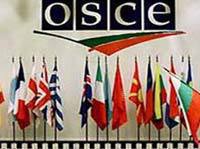Historically meaningless summit of obsolete organization
 On December 1 and 2 the Organization for Security and Cooperation in Europe is holding a summit in Astana, Kazakhstan. The last meeting of this organization was held 11 years ago in Istanbul. This makes the December OSCE summit in Astana a historic event both for Kazakhstan and for the entire world community.
On December 1 and 2 the Organization for Security and Cooperation in Europe is holding a summit in Astana, Kazakhstan. The last meeting of this organization was held 11 years ago in Istanbul. This makes the December OSCE summit in Astana a historic event both for Kazakhstan and for the entire world community.
For the first time in the history of the organization it is headed by a CIS country, which reflects the recognition of the increasing geopolitical importance of Kazakhstan in the international arena.
It was not an accident that Prime Minister Karim Masimov emphasized that the decision of the OSCE Ministerial Council to hold the supreme forum of the OSCE in the capital of his country was a historic success of Kazakhstan, which is especially noteworthy against the backdrop of the 11-year gap after the previous summit in Istanbul in 1999.
Why such an important role was given to Kazakhstan? French Consul General in Alma-Ata, Guillaume Narzhole, explained the reasons. "It is Kazakhstan's chairmanship in the OSCE that made the organization transform from a field of conflict between East and West to the ground for a dialogue. In the past five or six years, the OSCE was just a hostage to the differences between East and West. Therefore, it first should be noted that it was under the chairmanship of Kazakhstan when a new impetus was given to the OSCE development," he said.
In turn, the leaders of this country believe that ensuring the security of Europe is not solely the task of the European countries. As recently stressed by Prime Minister of Kazakhstan Karim Masimov, "We declare our intention to strengthen the organization's role in countering new threats and challenges, especially terrorism and drug trafficking."
Yet, if we put lofty speeches aside, the reasoning behind holding the first summit of the OSCE in 11 years in Kazakhstan goes beyond the willingness to accept it as an equal European partner. As we know, this country has a special strategic position in Central Asia as well as the largest reserves of energy in the region. According to expert estimates, oil sales alone will bring Kazakhstan over $700 billion in the next 30 years. The enhanced use of these resources will help to significantly reduce the dependence of the West from oil and gas from Persian Gulf.
In addition, according to some experts, another argument that affected Europe's decision to make Kazakhstan the OSCE chairman, is Astana's active participation in the Customs Union between Russia, Kazakhstan and Belarus. As noted by the OSCE Secretary General Marc Perrin de Brichambaut, "the Customs Union is a part of a globalizing world, the direction worthy of development. It will improve the stability and welfare of its members."
In other words, we cannot rule out that the OSCE chairmanship was given to Kazakhstan in order to eliminate its excessive rapprochement with Russia.
The OSCE used to play a prominent role in international affairs. For example, at the summit held in November of 1990 in Paris, the Charter of Paris for a New Europe which proclaimed the end of the Cold War was signed. The Treaty on Conventional Armed Forces in Europe was also signed there, and at the last summit in 1999 Russia pledged to withdraw troops from Georgia and Moldova.
What should we expect from the OSCE summit in Astana? Alexander Rahr, director of Berthold Beitz Center at the German Council on Foreign Relations, shared his thoughts with Pravda.ru.
"The level of significance of the OSCE today is clear from the fact that in his message to the Federal Assembly, Russian President Dmitry Medvedev did not even mention this organization. In other words, this structure is now of secondary importance compared to other institutions like NATO. The OSCE Summit will be held in the shadows of a recent meeting in Lisbon. That was the meeting where major international changes relating to security were discussed. Nothing like this will happen at the OSCE summit.
The following will happen at the Astana summit: the leaders of former USSR countries will throw all issues in one basket, including unresolved conflicts in the Caucasus (along with the issues regarding Abkhazia and South Ossetia, Nagorno-Karabakh) and the situation in Kyrgyzstan.
I will not even dwell on possible solutions. The question arises whether all the issues the participants of the summit are interested in can be simply put on the agenda of the meeting in Astana.
The OSCE is an obsolete organization which was preserved only because it is seen as a platform for a dialogue with the Eurasian countries such as Russia and Kazakhstan that are not able to speak on equal terms with the European Union. The presence of the OSCE allows these states to not feel excluded from the participation in international affairs."
Sergei Balmasov
Pravda.Ru
Subscribe to Pravda.Ru Telegram channel, Facebook, RSS!





